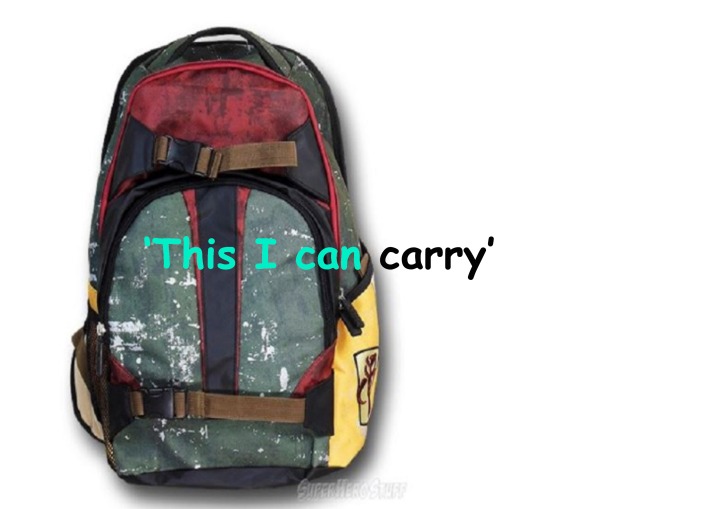
Everyone has, at some point, packed a bag to take with them on a journey; but how many of us have packed a bag that will hold all we have left in this world? When you’re forced to leave your home, what do you bring with you? What will fit into the rucksack or bag that you, yourself must carry for such a long way? What size is this bag, how much does it weigh? How much can you carry; physically, psychologically?
September 2017, Utrecht, the Netherlands. De Sociale Buurtmarkt/The Social Collective. gedachten over wat je meeneemt als je meteen moet vluchten Thoughts and reactions on ‘This I can Carry’ from those who attended the neighbourhood conference.
26th June – The Lab, Dublin. Delighted to have been asked to speak about this project by Silvia Loeffler, in connection with her ‘Transit Gateway’, deep mapping for the Docklands Art Projects.https://silvialoeffler.wordpress.com/transit-gateway-6-emergency/
20th June 2017 – World Refugee Day.
see this article in the Journal.
For World Refugee Day, the work will be shown in a public space in the follow galleries:
Dublin: Gallery of Photography, Douglas Hyde, Temple Bar Galleries. Cork: Lewis Glucksman Gallery. Kilkenny: Butler Gallery. Carlow: Visual, Centre for Contemporary Art. Annaghmakerrig: Tyrone Guthrie Centre. Derry: Void. West Cork: Catherine Hammond Gallery. Limerick: Limerick City Gallery of Art. Belfast: The MAC.
Portland, USA: Roll-Up Gallery, The Hague, the Netherlands: Spanjaardshoff. Utrecht, the Netherlands: AllOne.
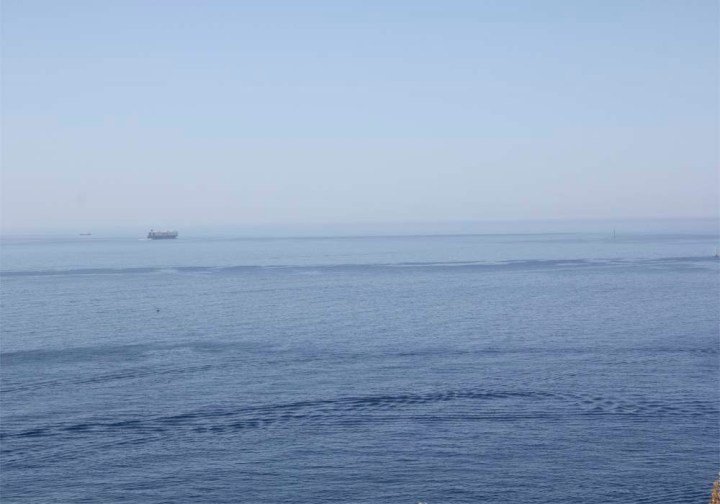
On the 11th of May (2017) I will be travelling to Athens to meet up and work with refugees who find themselves held up in Athens, Greece, waiting for a new, safe place to live until it is possible for them to go home. I will be working under the umbrella of the UNHCR and the Nostos Organisation to make work for my project ‘This I can carry’.
Using their personal belongings – what they’ve chosen to carry on their arduous journey – I’ll explore the individual’s plight as they flee their home to find refuge for themselves and often for their family.
In televised reporting on the refugee crisis, I’ve always noticed that the refugees carry a backpack or bag. The backpack, for me, acts as a common denominator. We can all understand it’s size and function, but in this case, it carries, stripped down, your life’s treasures and necessities for a long journey to a hoped for place of sanctuary.
FRIDAY 12 TH MAY.
This hotel used to be for tourists, now it is home to refugee families and individuals. These people are waiting (always the waiting) for a final piece of paper, giving them permission to either join family already in a European country or to start a new life in a country they have either requested or have been allocated residency. The allocation is according to the country’s allowance that come in and may not always be a preferred choice.
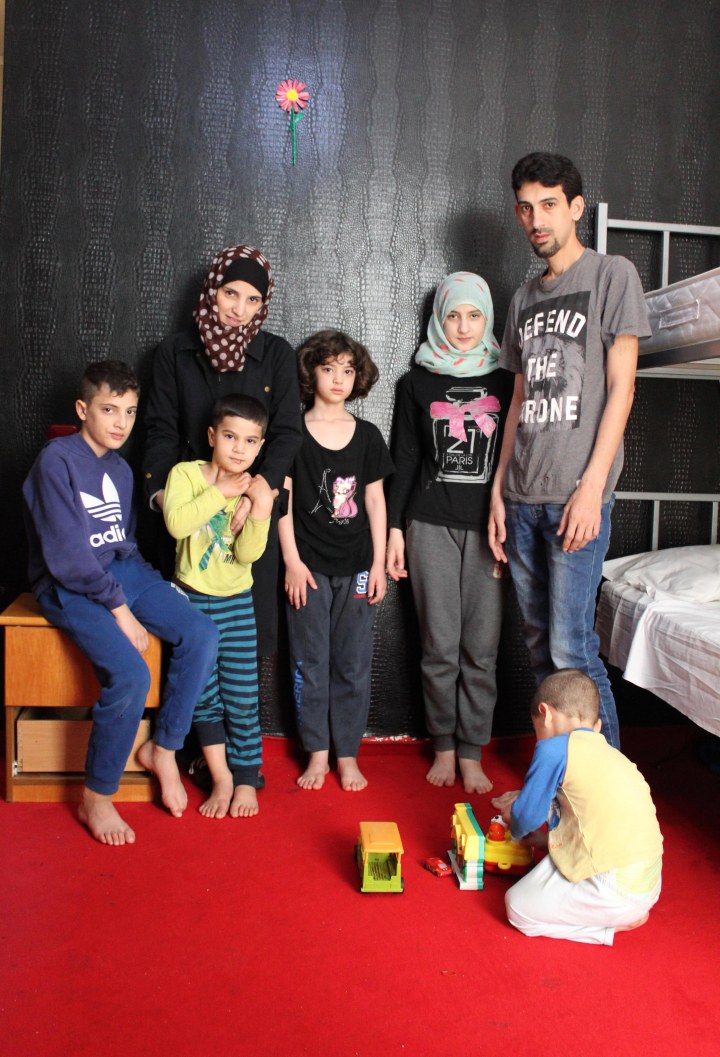
Just waiting, and waiting, and waiting for the next part of her life to begin.
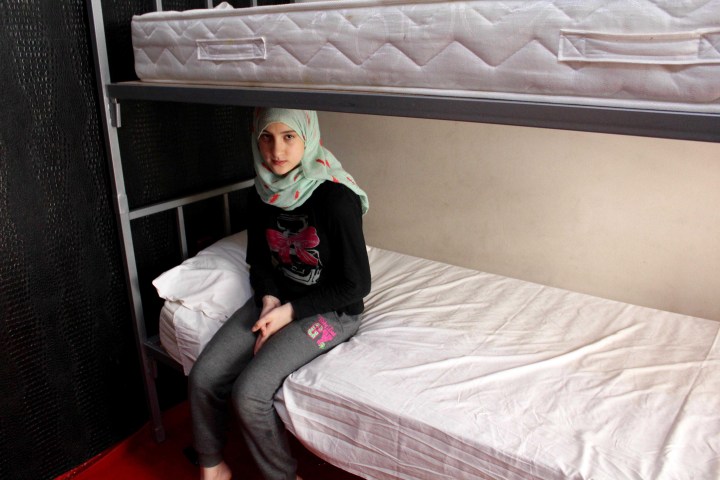
This young family of 7 have very little left of what they started out with. When they were picked up from a sinking boat, they just had a mobile phone. The mobile phone is their lifeline, it has contacts, it has images and it is the only possible way they have of keeping a line open to the place they started from. Every other object of value was either used to pay for passage, or, through necessity, thrown overboard to keep their leaky vessel afloat. These people travelled close to 18 months before reaching Greece. Anything that they did carry with them was either worn out, used up or exchanged for something that was going to keep them alive and together.
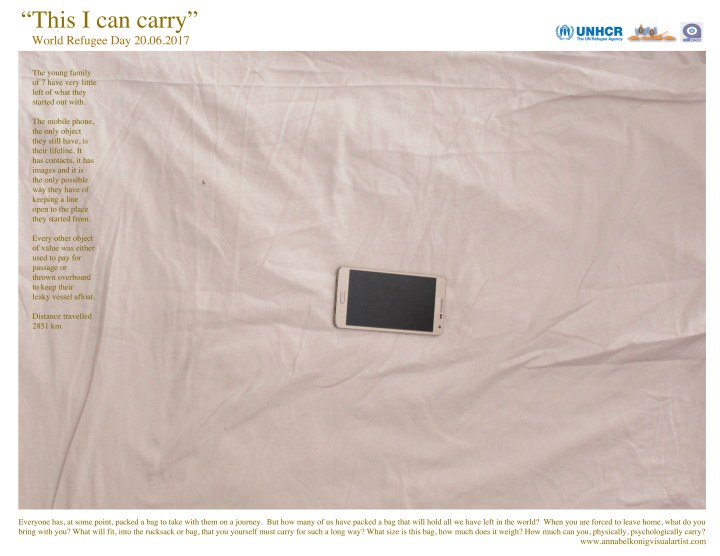
Ayhan, Hozan and their little girl Nosin.
This 26 and 27 year old couple have one, camera shy, little girl of three and a half. By trade he is a carpenter and works with computers, she is a biologist. These educated people have left Syria because there is nothing left for them there apart from his parents. The war has destroyed their future and, if they do every go back, it will just be for a visit to see his parents; a holiday. These people finally arrived in Greece by boat, it took 10 days and then they were fortunate enough to be picked up by a large aid vessel. Her family is already in Germany, and they hope to be able to get a Family Re-Unification residency near them once they have completed the mandatory integration period of six months in their allocated German town or city.
When someone is awarded residency, it is only for a specific country. They can move within that country but are not allowed to go and live in another European state unless they go through the application system again.
I asked them why they did not travel with the rest of her family when they left and she replies ‘money’. They only had enough money to pay the boatmen to get as far as Greece.
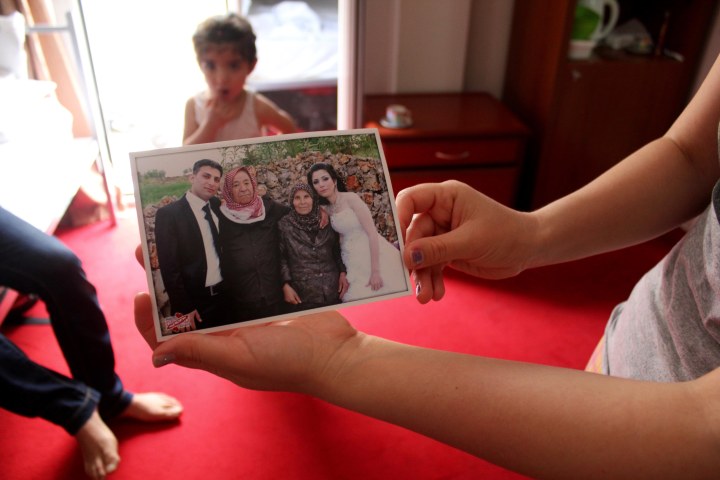
Their belongings from Syria don’t add up to much. When I asked them what they carried with them, they show me some paper bills, which were legal tender before the 2010 war and now are souvenirs. The jewellery Ayhas has left is a necklace and a pair of earrings, the rest went was used as payment for the boatmen. There are a few handwritten notes written in Arabic and their identity papers. Much treasured are a few photographs of family and three images of their wedding day. The most precious thing they managed to carry with them was their only daughter who was 18 months old at the time of leaving.
It is difficult to ask people what was in their rucksack/bag when they left home and what it is that they have now. The objects of value that they did bring, were handed over to various people, at various stages of their journey. These objects were often family heirlooms, reminders of home and also something which they would liked to have passed on to their own children. They had to make a choice along the way, and I see the far away look that comes into some of the women’s eyes as they recall what they have lost. The men’s faces harden somewhat and they seem to close up.
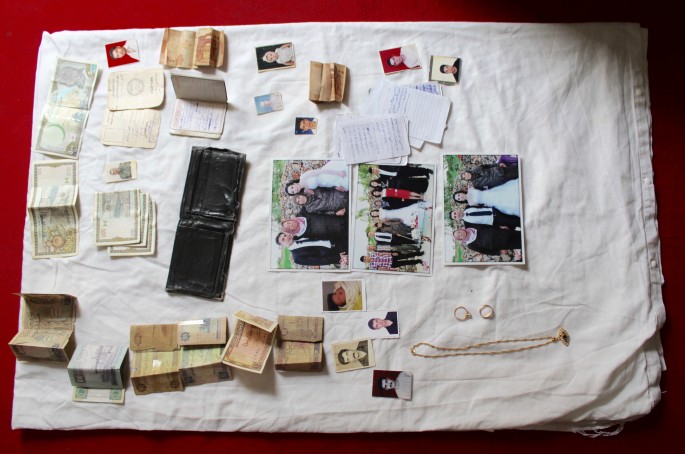
SATURDAY 13 TH MAY.
A centre I visit was opened in 2016. It was built specifically for unaccompanied minors. The first requirement on the list, outside of the building, was Wifi. Teenagers are the same everywhere. The centre has space for 20 boys, ranging in age from 13 to 18. There are currently 18 boys here and the youngest will turn 17 next month. When a boy reaches 18 he must leave and either be re-housed in a grown up centre, or find his own way in life.
The boys come from many countries such as Syria, Tunisia, Bangladesh, Afghanistan, Iran, Iraq, Pakistan etc there is no discrimination here. The 17 staff members work in rotation. The aim of this centre is to prepare the boys for a life in Greek society. The members of staff are all trained in specific areas of life (Social workers, Nurse, Councilors, Teachers etc) and there are several translators as the boys mostly don’t speak Greek when they arrive. The staff members that I met are all in their early to mid 30’s and most of them do not have children of their own. They also come from many countries and are tasked to help these teenagers cope with this place where they are now going to live.
When mentioning ‘This I can carry”, one young boy told me he arrived with the clothes on his back; the brown, traditional clothing of his home country; Pakistan. This was all he had left and he didn’t start out with much. Just some food and some objects for barter. His two sisters and two brothers, who are still in Pakistan, are living with his mother. His father is no longer alive. As ‘man of the house’ there was pressure on him to provide, he can, now, no longer fulfill that position.
His dream would be to finish school and become an electrician.
The staff at the centre mention that it is hard to get him to open up and he spends much time on his own. He speaks so quietly it is hard to hear him. The translators lean forward to catch his words.
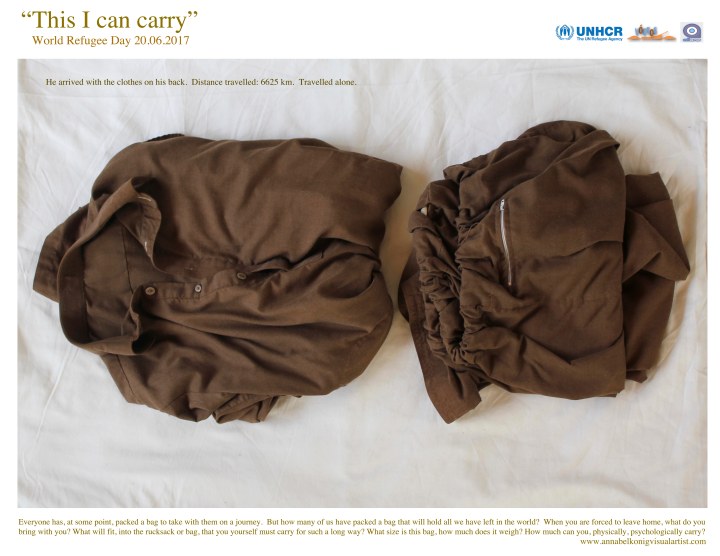
Another boy I meet calls himself a poet and a musician. He managed to bring a big bag with him, compared to what the others have. It was packed with some of his work and computer gear. He did have more things that he wanted to bring with him, things that had belonged to his father who was killed, but he couldn’t. These things are in a locked locker in Iran and his mother has the key. Some day he hopes to be able to get these precious things that are his heritage.
There are various reasons why these boys are unaccompanied minors. It may be that they have run away from home without their parent(s) blessing. They may have been encouraged and financially aided by their parent(s) due to the precarious situations within their homeland. They may have lost their parents along the way, or, some families believe that if they send away one child, who is then an unaccompanied minor, they will be better received and acquire residency status more easily. If this then happens, it allows the rest of the family to apply for Family Re-Unification. It is hard to tell. The boys’ stories are listened to in many interviews and if possible, verified by several established organisations and agencies.
Whatever the reason, I cannot begin to understand what goes through their minds. The knowledge of abandonment, expendability and, if they can’t bring their family over, there is the pressure of lost honour and shame.
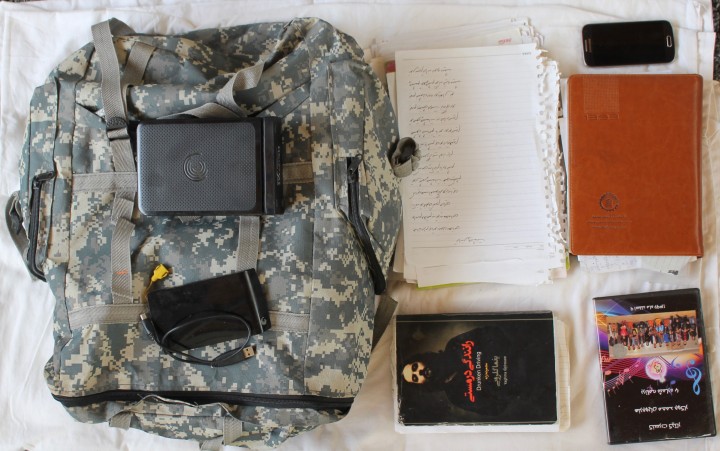
TUESDAY 16 TH MAY am.
I am up at 5.30 am to go to Omonio Square to find Hozan and Ayhan and their little girl Nosin. They are leaving on the airport bus today to fly to Germany. As I walk in the cold morning air I wonder how long it will take me to find them. Ormonio Square is a busy spot. Six roads converge and circulate; it is one of the city’s main junctions. I need not have worried as there are about 200 people waiting to get on the busses. Early morning workers ignore the goings on, they may be used to this, but for me it is the most emotional of scenes I have experienced on this trip.
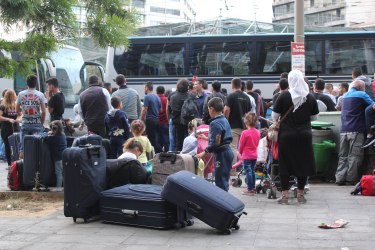
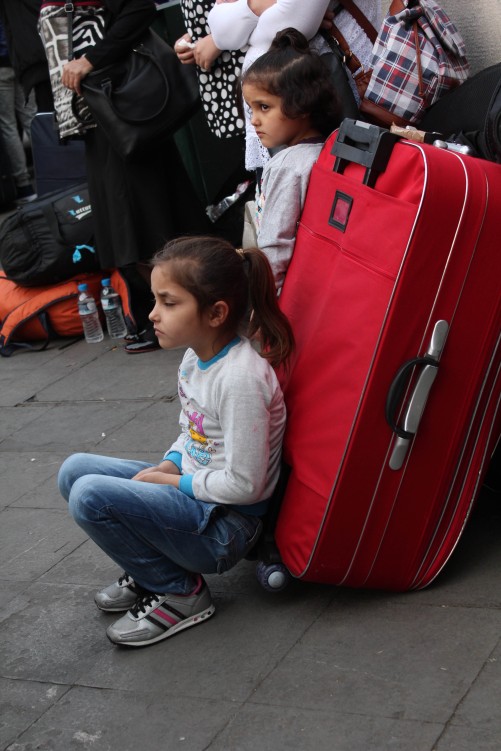
The area is filled with laughter and quickly spoken Arabic as if there are things to be said in a hurry that were not said in the year and a bit that most people have been here, waiting.
Some know each other, be that though various camps, housing situations, or just through their cultural connections. When the busses arrive and the names are taken. It seems kind of silly, but as each person enters the bus they hand over a little green ticket that gives them this important passage. One, little, green ticket to get them on their way.
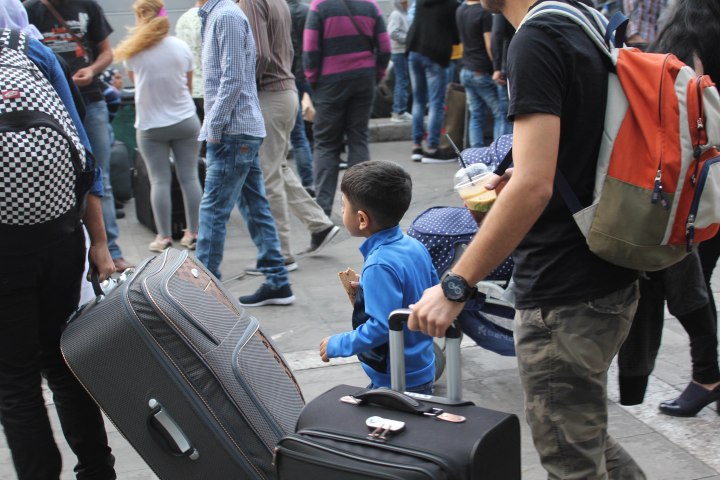
This is a joyous time for these people. There is much hugging and a rush of last minute photographs and within 20 minutes the corner of this large meeting point is empty. If you had just arrived, you would not have know that there are now 200 odd people on their way to start a new life.
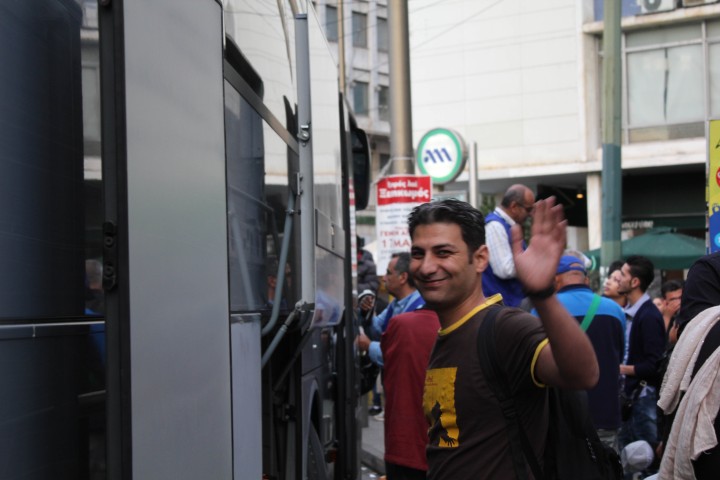
Considering these people arrived with little or nothing, it is interesting to see how many bags and rucksacks they have now. All of the aid they have received has been provided by charitable groups and world organisations such as the UNHCR. Apart from the basic human rights needs, each refugee is also given a sum of money each month to buy with what they would like. It could be a something that they consider a necessity, such as phone credit or specific food, sometimes money is sent back home. For many women, the first thing that they buy is lipstick and make up. I find that a very moving, visual image in my mind’s eye. Women trying to find back their individualism, a bit of their identity and how they would like to present themselves to the world.
Interesting also is that when refugees such as these, pack their bags to leave, they are confronted by the same situation; ‘this can I carry’. There is a baggage allowance when flying and even though many came with so little, they have gathered and were given things during their stay in Greece.
In conversation with a UNHCR employee one evening, we discussed the notion of what we would pack if we had to leave. As we spoke about the necessities such as food, water, mobile phone, money, spare clothing, bartering objects etc or the luxuries, such as toothpaste and toothbrush, soap, swiss army knife, salt, we realised that there was more to packing when leaving a home. Packing is a skill. Those that travel more, get good at it. Those that pack with time to consider, revise what goes into a bag. But those who must leave on short notice, or from a place where there is little left, might consider different necessities to put into the bag they themselves, must carry.
TUESDAY 16th MAY, 10 am.
I am at a different hotel to meet 5 single men and a family consisting of parents and one teenage son. They are moving from the hotel to apartments so that they may live their lives a little more ‘normally’.
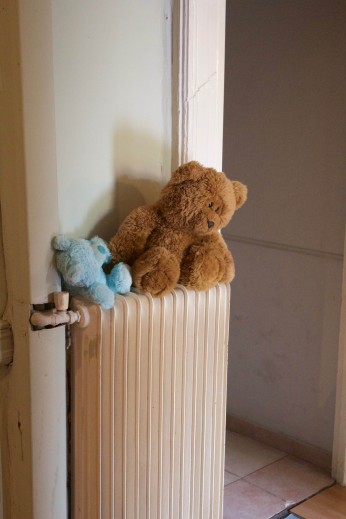
There are other families that remain in the hotel and they too will be given places as they are found. All costs associated with housing, will be paid for by the UNHCR. This hotel will, over the next few months, return to being a tourist hotel. Many of the hotel owners would prefer that the refugees stay, it pays better than the tourists and it guarantees full occupancy.
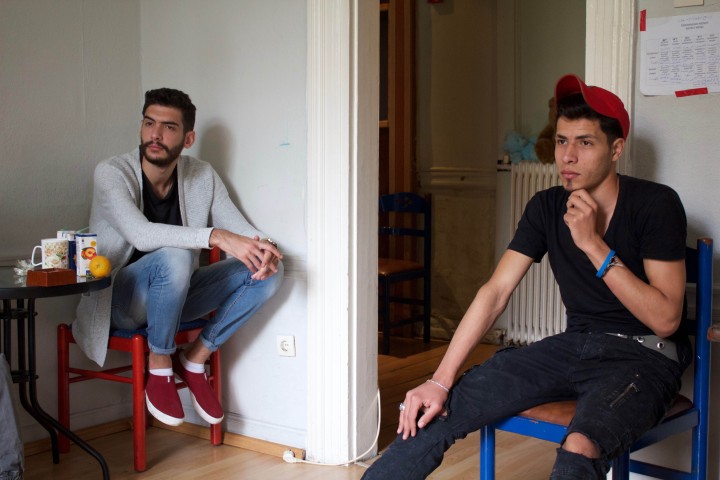
I see the family and single men on their way (it seems to be that kind of day) and I will meet them again tomorrow in their new abode.
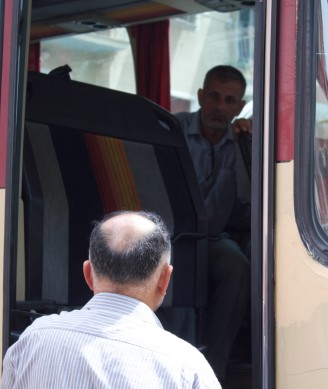
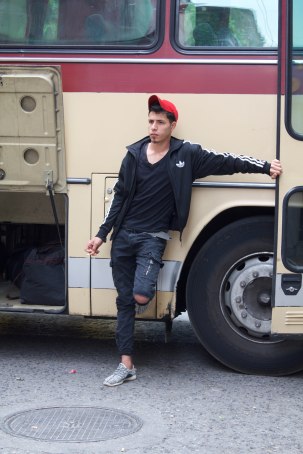
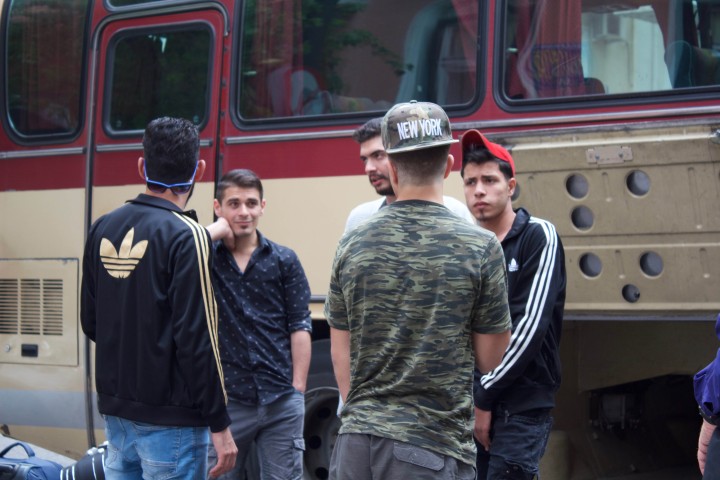
WEDNDESDAY 17 TH MAY.
I am on my way to meet Ziad, Yasra and Mohammad in their apartment in the area of Llisia.
Ziad was a military officer and an aviation engineer in Syria. His wife, Yasra, is a pharmacist and she used to own her own pharmacy. One day the shop was bombed and burned out. Ziad was suddenly forbidden to work and he could not leave the region by the powers that held sway in their neighbourhood.
They lived, together with their children, in laws and extended family, in the country town of Deraa. They have now been in Greece for 7 months and they cannot believe their luck that they have moved from an agency hotel and given an apartment of their own to share with another family. Yasra has some English and is a warm and giving woman. She is a carer of people.
For the first time in a very long time, this family has been able to cook a meal that they have prepared themselves. They don’t have much money but they did manage to make food from their home country, food that they shared and ate sitting on their bunk beds as they don’t have a table or any chairs. It was the best meal they have ever had, they all agree.
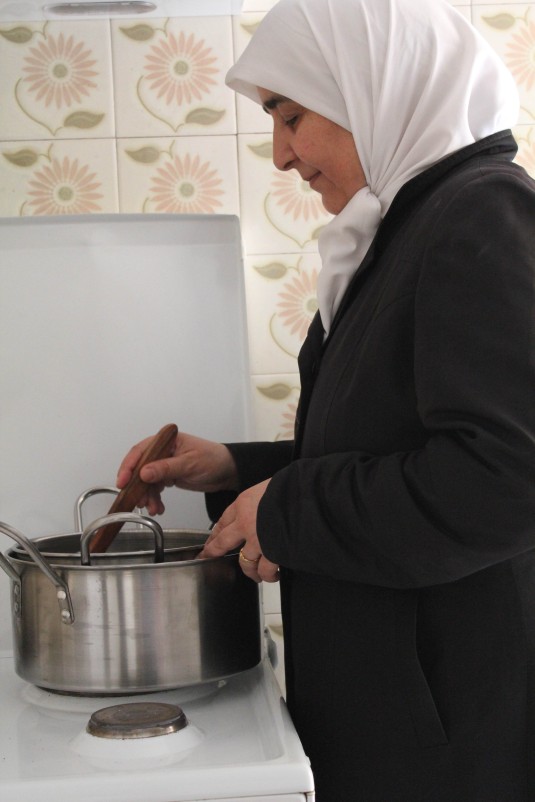
As we sit on the bunk beds in the bedroom, Yasra smile beams as she speaks of her family. Her face straightens up when she speaks of the people that have been lost. As a pharmacist she was often called upon to help with the wounded. Doing this caused her to be arrested and detained. Her son, Mohammad (then just 14) was arrested for standing by a barrier; perhaps he stood on the wrong side. It was time for them to leave.
These wonderful, hospitable people welcomed me into their homes with joy and trust. They made coffee, Syrian style. As Yasra and myself drank out of tall glasses, father and son had theirs out of jam jars. I hope that they can fulfill their dreams and that some day, as they would like, reunite as a family and a community in Syria, that they can go home to a place that has their hearts and their history.
This family arrived with nothing in Greece, having paid the smugglers with all they had. Even the clothes on their backs were worn out and torn. They were given clothing, food and shelter and from there are trying to re-build a life.
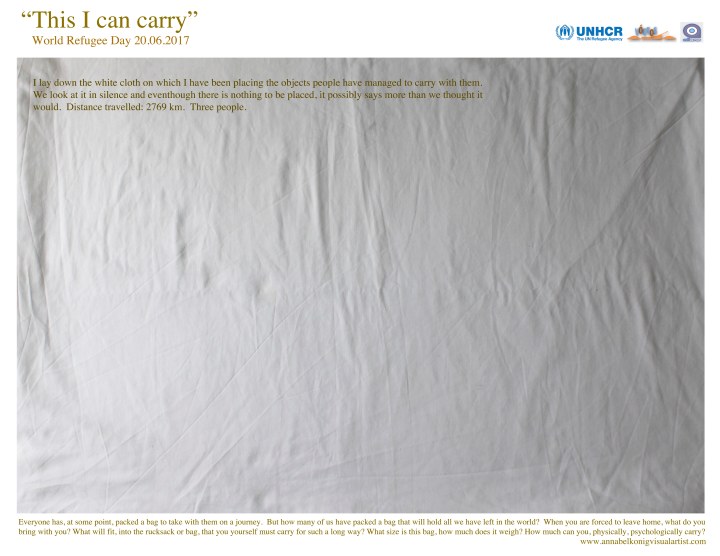
I lay down the white cloth on which I have been placing the objects many people have managed to carry with them. We look at it in silence. This empty cloth halts our chatter. We all look at it and see that even though there is nothing to be placed, it possibly says more than we thought it would.
Leaving this joyous but sparsely furnished apartment, I think again about what I would carry. I also wonder, what people in Ireland, or the Netherlands, or any other first world country would put on that piece of cloth having had to leave home by necessity. This includes those who live, displaced within their homeland for whatever reason. I wonder, physically and physiologically, what they could carry.
Categories: 2017,, International, photography, public participation, Refugees, This I can carry, Work in progress
1 reply »